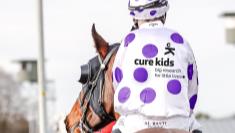.jpg)
NZTR Retraining Clinic well-received at Taupo
Thoroughbreds provide the racing industry with incredible thrills on the race track, and New Zealand Thoroughbred Racing (NZTR) are dedicated to giving back to the equine athletes by assisting in their transition into sport horse careers.
NZTR recently sponsored a thoroughbred-focussed training clinic held at the National Equestrian Centre in Taupō, with the NZTR’s Welfare Coordinator Tracey Oakes initiating and assisting two days of learning and development.
The clinic was tailored to build confidence and skill between horse and rider, developing partnerships with knowledge of how to move in a positive direction.
“We’ve been considering for a while how we can assist thoroughbreds into their first home post-racing or coming out of the Acknowledged Re-Trainer network,” Oakes said.
“We wanted to create a super supportive environment for people to bring their thoroughbreds to what could potentially be their first outing after entering their second career. We got a great range of people from those having their first time out, to horses that have had a bit of schooling and some with experience.
“The 65cm class were jumping up to about 90cm by the second day, which was a reflection of the confidence between horse and riders throughout the two sessions. We had one rider who had done plenty of schooling at home but was a bit concerned about coming to a public venue, and her horses went beautifully.
“We had another participant who competed to a high level in the past but had since had a family and was a bit worried as well, but her horse was flying by the end of the clinic which was fantastic to see.”
The combinations were privileged to have lessons with top-class event riders Donna and Elise Edwards-Smith, who are huge supporters of the thoroughbred breed having produced a multitude to compete in the highest levels of eventing, including DSE Tangalooma and DSE Mendoza.
“I contacted Donna and Elise to discuss all things thoroughbreds in the equestrian world and we discussed the possibility of running a clinic, which we ended up being able to do,” Oakes said.
“They are super enthusiastic, and they love thoroughbreds, they compete on them and are such good advocates for the breed in equestrian sports. We were fortunate to have found the right people at the right time.
“They were brilliant, they helped people in the right way with practical, simple support and everyone came away with homework at the end of each class.”
Justine Sclater, NZTR’s Head of Welfare and Sustainability, also attended the clinic and was thrilled to see the level of improvement and enthusiasm among the participants, extending to pedigree background.
“It was really inspiring and I got a lot of satisfaction seeing the progression and relationship built over the two days. The horses adapted hugely over a short period of time, so it was very worthwhile and positive,” Sclater said.
“The riders really enjoyed learning about the breeding aspect through microchip scanning that Tracey undertook, and we were able to discuss the pedigrees and sires in depth which opened another area of knowledge in relation to their horses.
“I’m hugely in support of doing more clinics, we are looking to incorporate further opportunities and this one was oversubscribed, indicating the need and appetite for them.
“I congratulate Tracey for initiating the clinic, and Donna and Elise are a class act, they had an amazing rapport with the riders and gave fantastic advice and techniques to go forward with.”
NZTR will conduct a South Island clinic in Canterbury this Sunday, 28 July, with an altered format hoping to achieve the same positive response.
“At the same time as we were discussing the Taupō clinic, we started organising a clinic with Lisa Wilson of Pinoaks Park in Canterbury, who has done the administration for us,” Oakes said.
“It is a different style to the Taupō clinic, we will have three coaches for show jumping, dressage/showing and horsemanship/liberty. People were given the option of who they would like to receive guidance from in a lesson, and some are taking the opportunity to see more than one coach through the day.
“We have people travelling from as far south as Invercargill and Dunedin, who are making long trips to get to the arena at Selwyn Equestrian Centre to attend.”
Beyond Sunday’s clinic, the industry has a long way to go in making the transition from racing to sport horse life seamless, but Oakes saw a glimpse of the bright future in store for thoroughbreds off the track.
“We were happy to provide assistance by co-sponsoring participants attendance,” Oakes said.
“The riders still had to invest to come, we covered costs of one lesson, the use of the arena, ground fees. The riders paid for Evo Events fees, one lesson and the yarding, so it was a split cost to make our funds last a bit longer.









